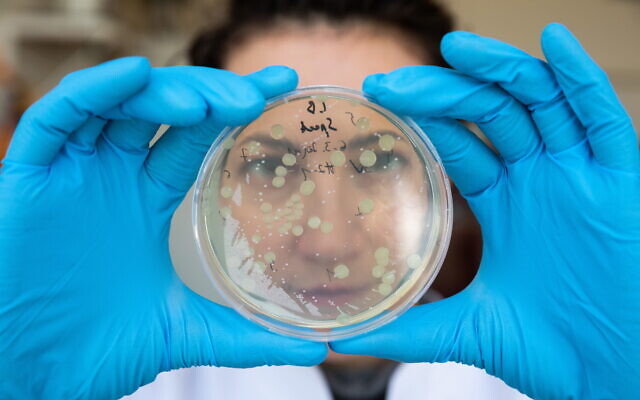200 students sign up to be screened for severe Jewish genetic disorders
Jnetics' week-long virtual event from 23-29 November will allow those on campus to take part in carrier screening for nine of the most severe Jewish genetic disorders

Almost 200 Jewish students have signed up for a screening week at universities in November and more are being sought as medics aim to help identify carriers of the most severe Jewish genetic disorders.
Run by the charity Jnetics, the first ever virtual GENEius University Screening Week (GUSW) will take place 23-29 November, with students who sign up able to know if they are at risk of passing on any life-threatening genetic inheritance.
“GUSW is a week-long virtual event through which Jewish students can take part in carrier screening for nine of the most severe Jewish genetic disorders (JGDs) for free and from home,” said Jnetics’ new chief executive Nicole Gordon.
“Almost 200 signed up in the first week, which is way beyond our expectation, and we would like to be able to screen all youngsters who ask for this.”
The GENEius programme is Jnetics’ flagship education and screening initiative. Jewish students in Year 12 and at universities are educated about JGDs and the importance of carrier screening in their prevention, before accessing that screening.
The test covers severe recessive disorders such as Tay Sachs, Familial Dysautonomia and Bloom Syndrome that, while not exclusively Jewish, have a much-increased prevalence in the Ashkenazi Jewish population.
“These disorders are all devastating, incurable and life-shortening conditions that are entirely preventable via carrier screening,” said Gordon. “Similar international student screening programmes have had immense success, virtually eradicating these disorders from the community.”
If a student finds out that they ‘carry’ one of these JGDs, Jnetics says they at least then have the information they need to decide whether to avoid passing on a severe and incurable disorder to any future children.
Participating in GUSW is quick and easy, said Jnetics programme manager Greg Blank, with students pre-registering online and choosing a virtual screening appointment, before receiving a screening pack in the post containing a saliva kit.
“Their virtual appointment is by video-call with a trained advisor in which key information is covered, consent taken, and the saliva sample given,” said Blank.
“After the appointment, students simply return the sample to us in a prepaid return envelope, results are returned via email from our dedicated genetic counsellor up to 16 weeks later, and any carriers identified will be offered a follow-up phone call.”
The charity has recruited more than two dozen campus reps to increase awareness, it said, in an initiative that has the support of the Union of Jewish Students, the University Jewish Chaplaincy, several Aish and Chabad rabbis, as well as youth movements such as Habonim, RSY, Noam, LJY and Bnei Akiva.
The cost for one student to get screened is £300. Jnetics is fully subsidising that cost, said Gordon, but to help fund the initiative, the charity has launched a ‘Sponsor A Student’ campaign, asking parents, grandparents and others to help by sponsoring a student to get screened during this event.
“We have a responsibility to the community to accept all students who wish to be screened,” she said.
To be eligible to take part, participants must be over 16, have at least one Ashkenazi Jewish grandparent, and be either an undergraduate or postgraduate student.
- For further information or to make a donation visit www.jnetics.org/donate
- To sign up before the Monday 16 November deadline visit: www.geneius.org/gusw

Thank you for helping to make Jewish News the leading source of news and opinion for the UK Jewish community. Today we're asking for your invaluable help to continue putting our community first in everything we do.
For as little as £5 a month you can help sustain the vital work we do in celebrating and standing up for Jewish life in Britain.
Jewish News holds our community together and keeps us connected. Like a synagogue, it’s where people turn to feel part of something bigger. It also proudly shows the rest of Britain the vibrancy and rich culture of modern Jewish life.
You can make a quick and easy one-off or monthly contribution of £5, £10, £20 or any other sum you’re comfortable with.
100% of your donation will help us continue celebrating our community, in all its dynamic diversity...
Engaging
Being a community platform means so much more than producing a newspaper and website. One of our proudest roles is media partnering with our invaluable charities to amplify the outstanding work they do to help us all.
Celebrating
There’s no shortage of oys in the world but Jewish News takes every opportunity to celebrate the joys too, through projects like Night of Heroes, 40 Under 40 and other compelling countdowns that make the community kvell with pride.
Pioneering
In the first collaboration between media outlets from different faiths, Jewish News worked with British Muslim TV and Church Times to produce a list of young activists leading the way on interfaith understanding.
Campaigning
Royal Mail issued a stamp honouring Holocaust hero Sir Nicholas Winton after a Jewish News campaign attracted more than 100,000 backers. Jewish Newsalso produces special editions of the paper highlighting pressing issues including mental health and Holocaust remembrance.
Easy access
In an age when news is readily accessible, Jewish News provides high-quality content free online and offline, removing any financial barriers to connecting people.
Voice of our community to wider society
The Jewish News team regularly appears on TV, radio and on the pages of the national press to comment on stories about the Jewish community. Easy access to the paper on the streets of London also means Jewish News provides an invaluable window into the community for the country at large.
We hope you agree all this is worth preserving.





















